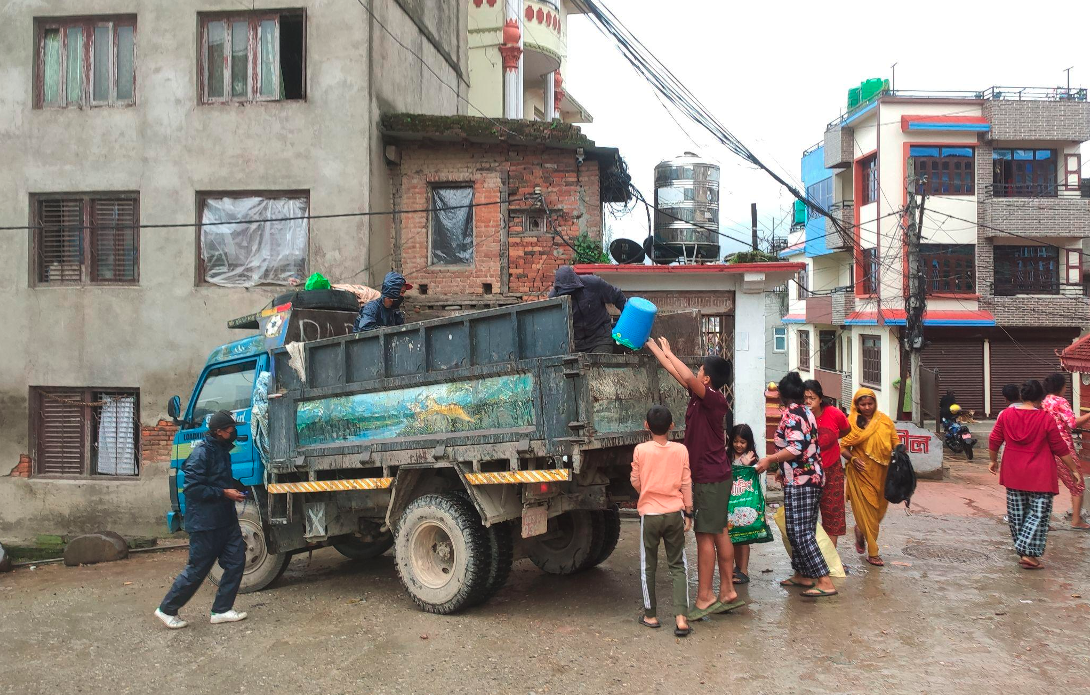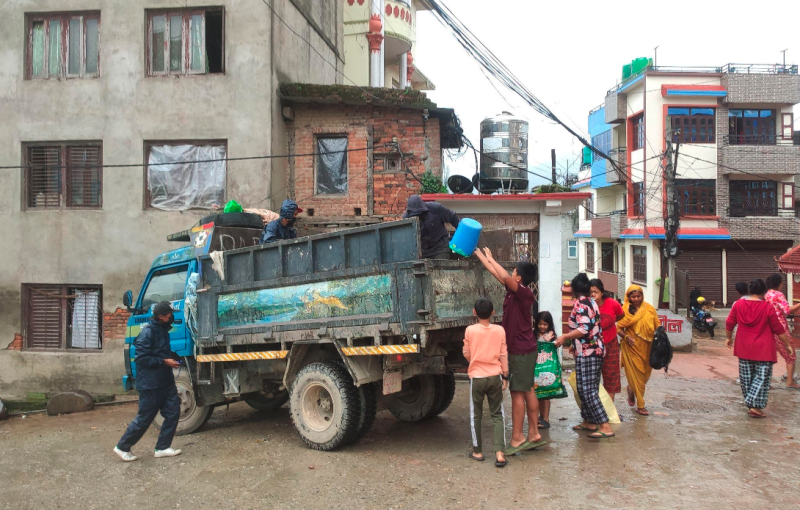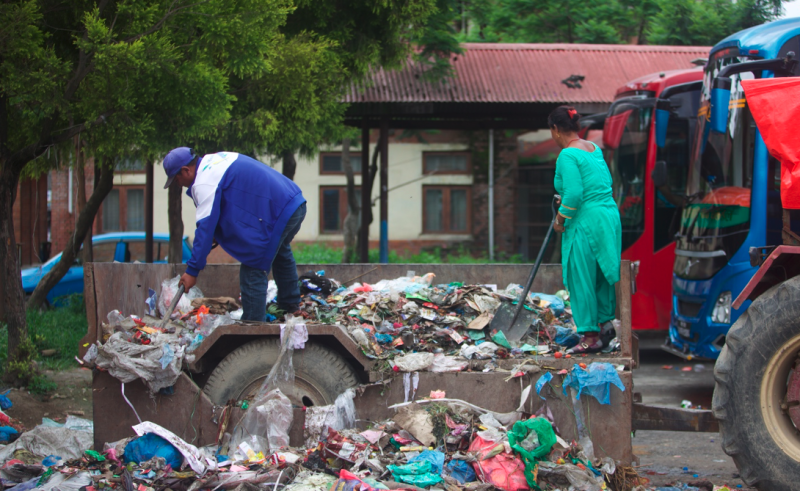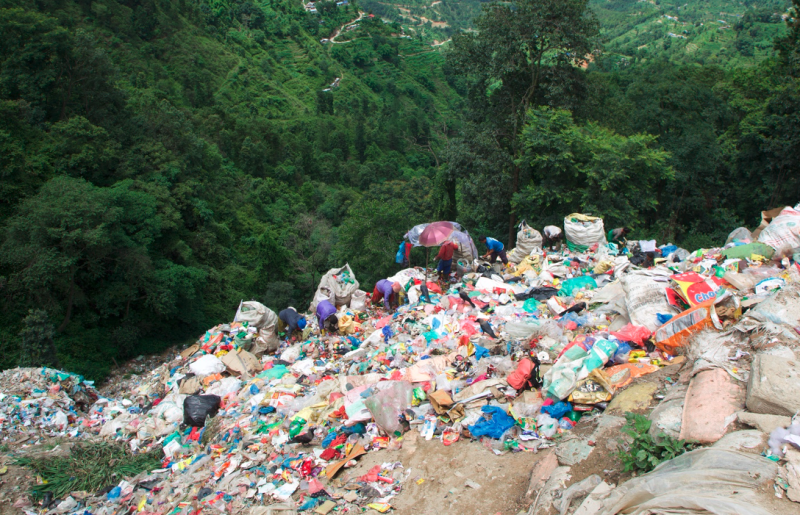
Posted on September 4, 2023
With Nepal’s increasing population and urban growth, it is imperative for the country to actively embrace and leverage the benefits of the circular economy approach to shift towards responsible consumption and production. The circular economy shifts from the linear “take-make-dispose” model to a circular framework, emphasizing an economic model that focuses on reducing waste and optimizing resource utilization by extending the lifespan of products and materials.
At the grassroots level, waste workers, both formal and informal, play a pivotal role in facilitating a more equitable transition to a circular economy. However, they encounter persistent challenges within the waste management sector. These challenges include discrimination based on caste and occupation, as well as instances of verbal abuse directed at drivers and workers when waste collection vehicles are missed. Some individuals opt to dump their waste on the roadside rather than wait for a waste collection vehicle. Unfortunately, waste workers and the waste management industry as a whole often face negative stereotypes, discrimination, and stigmas associated with pollution, uncleanliness, and marginalization. While people desire clean and healthy communities, they often resist and express reluctance when it comes to having waste management facilities nearby.
Furthermore, there is a shortage of training opportunities for waste segregation and collection processes for waste workers. There are also discrepancies in payment scales between male and female workers, as well as a lack of proper tools for waste collection.
 Figure 1 Community people throwing mixed waste in the truck; children seem to engage in the transfer of household waste to the collection vehicle
Figure 1 Community people throwing mixed waste in the truck; children seem to engage in the transfer of household waste to the collection vehicle
 Figure 2 Unloading of municipal waste in the transfer station
Figure 2 Unloading of municipal waste in the transfer station
Waste management should be considered a shared responsibility and duty that extends beyond those directly involved in the industry to encompass every individual citizen. Household waste, driven by escalating urbanization and rapid population growth in urban areas, stands out as the primary source of waste generation, apart from industrial units. Unfortunately, the absence of effective source segregation and separate waste collection practices has created a situation where waste collectors face significant challenges in separating recyclable materials. Consequently, a considerable portion of recyclable waste ends up in landfills.
This improper segregation also leads to the indiscriminate disposal of various items, including food scraps, liquids, acids, batteries, glass, e-waste, and sharp objects. Such disposal not only releases harmful gases like methane into the atmosphere but also poses substantial risks to the health and well-being of waste workers. They are exposed to acids and sharp objects, resulting in accidents that jeopardize their safety. Many waste workers have voiced concerns about health-related issues, such as skin diseases, hepatitis, tuberculosis, and fever, which they frequently encounter due to direct exposure to waste.
Socioeconomic factors, high-stress levels, and deteriorating mental health problems are also prevalent issues among waste workers, contributing significantly to the rising prevalence of alcoholism within this community. Moreover, waste workers often encounter difficulties when seeking medical attention for cuts, punctures, or other work-related accidents. They sometimes struggle to promptly change their soiled clothing during emergencies, which can lead to feelings of discrimination in medical treatment due to their appearance.
 Figure 3 Waste picking by the informal workers in the dumping site, Dhulikhel without PPE
Figure 3 Waste picking by the informal workers in the dumping site, Dhulikhel without PPE
Waste management enterprises and private vendors have expressed dissatisfaction due to the risks they face and the losses they incur as a result of the fluctuating market prices of materials. Many of them are also frustrated by the fact that, despite being officially registered companies with Permanent Account Number (PAN) licenses, they are unable to access banking facilities such as loans and subsidies.
However, there is a silver lining as a few municipalities have taken the initiative to promote the circular economy by collaborating with private entities to separate valuable materials from waste instead of sending everything directly to landfill sites. Waste management vehicles now operate on a biweekly basis to meet the community’s demands, and the waste is transported to private sector facilities where it is sorted for recycling and reuse purposes. Additionally, some private vendors or collection centers have started opening bank accounts for their employees to encourage a culture of saving, allowing them to allocate a portion of their salaries for future needs.
The concept of the circular economy is still relatively new in Nepal, and it will require time to fully integrate this approach into the country’s waste management sector. The crucial role that grassroots workers play in the circular economy should be acknowledged, and a supportive environment should be established to keep them motivated and engaged in the waste management sector. For that, several key points can be taken into account to address the current gaps in the waste management sector:
- Emphasize the importance of creating a respectful and inclusive working environment; establish a grievance mechanism to address discrimination, and promote equal treatment to all workers.
- Promote the adoption of appropriate waste disposal methods, adhere to consistent waste collection schedules, and discourage the improper disposition of waste in inappropriate locations.
- Enhance the modern technological system of waste management discouraging the manual system of waste segregation by the use of automated sorting devices.
- Formalize the waste management system by proper digital documentation of the waste collection data, waste worker numbers, and other resources to make the system more transparent and effective.
- Collect the gender-disintegrated data to understand the specialized needs and challenges of all genders.
- Provide equitable pay and opportunities, diversify roles and responsibilities, and actively promote women’s greater participation in the sector.
- Implement comprehensive training programs, provide appropriate safety equipment and measures, and conduct regular medical examinations.
- Implement a system of health insurance and accidental insurance for the vulnerable group of waste workers.
- Raise awareness about waste segregation, establish guidelines for source segregation, and promote segregation practices at the household, institutional, and industrial levels.
- Establish and enforce comprehensive waste management policies, implement strict regulations on waste deposition and segregation, and support sustainable waste management practices.
- Supply workers with essential protective gear, ensure appropriate infrastructure for waste management, and conduct regular health check-ups to prioritize the health and safety of workers.
